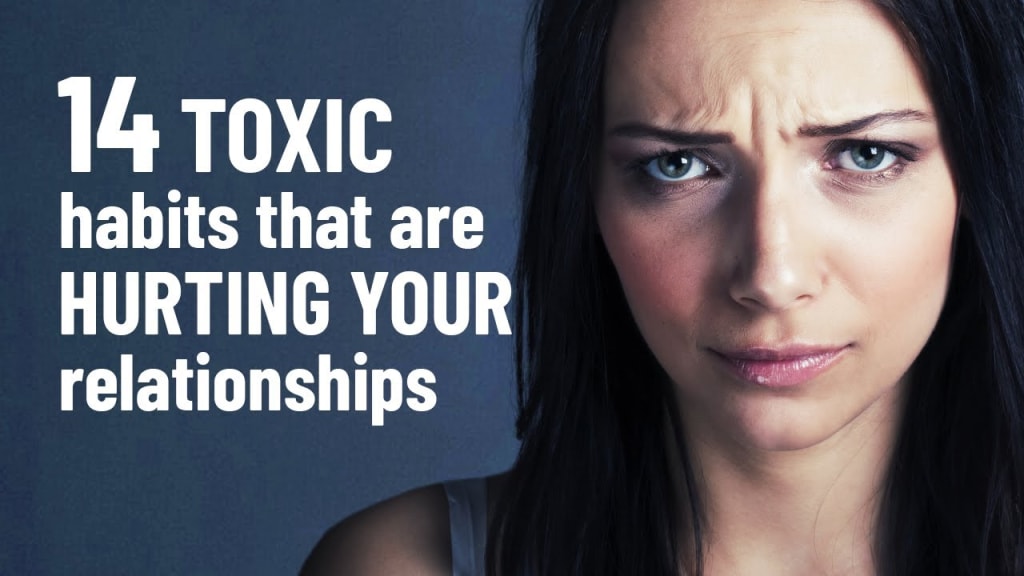14 Toxic Habits That Are Hurting Your Relationships
Navigating relationships isn't easy. Whether you want better romantic, familial, or platonic connections, you're going to need to put in the emotional labor, and it's hard work. Sometimes though, our less-than-ideal behaviors get the best of us, and we all display certain toxic traits now and then. Obviously, no one wants to hurt the people they love, but that doesn't mean you're not damaging your relationships with the following habits:

14 Toxic Habits That Are Hurting Your Relationships
Navigating relationships isn't easy. Whether you want better romantic, familial, or platonic connections, you're going to need to put in the emotional labor, and it's hard work. Sometimes though, our less-than-ideal behaviors get the best of us, and we all display certain toxic traits now and then. Obviously, no one wants to hurt the people they love, but that doesn't mean you're not damaging your relationships with the following habits:
Number 1 - Minimizing Or Invalidating Other People's Feelings When something bad happens, we typically confide in those we love and trust. And surely, just the same, there are people who come to us when they're upset. The problem is that you might be minimizing or invalidating others’ feelings without realizing it. Saying "it's not a big deal" is a big deal, because you're communicating that you think they're overreacting. When you make someone doubt themselves by invalidating their emotions, it can make them feel worse. Even unloved or unworthy. That doesn't mean you need to agree with them, but it does mean you need to make an effort to acknowledge their feelings.
Number 2 - Not Respecting Boundaries Healthy relationships have boundaries that are respected. Boundaries can be physical or emotional and can include touching on topics like how you spend your time together, what you feel comfortable doing or not doing, and even what you talk about. When you show respect in this sense, it communicates that you genuinely care. If you find yourself overstepping, you're disrespecting someone's boundaries. And if pushing someone's limits is normal to you, you may need to rethink how you see other people's time and space. Your entitlement could be creating discomfort, distance, and damage in your relationships.
Number 3 - Always Having To Be Right If your need to always be right often shuts down conversations, you probably make people feel unheard. And they might start to see you as cocky, obnoxious, or rude. That goes for new acquaintances as much as it does for old friends or family members. Admitting that you were wrong or that you made a mistake is essential for growth, and it conveys a sense of respect and acceptance for the opinions of others.
Number 4 - Insulting Others It's never okay to intentionally hurt someone, no matter how angry or upset you are. We all know that explicit insults are toxic and just plain mean, but it's also important to recognize that backhanded compliments and jokes can be just as harmful. If you make comments like, "I love how you don't care how you come across," then causing self-doubt in others probably comes as second nature to you. Purposefully making people feel bad about themselves is toxic, and it will ruin your relationships.
Number 5 - Giving Unsolicited Advice You might have the best intentions, but when you give unsolicited advice, it often comes across as patronizing. As a general rule, assume that people don't want your advice, unless they ask for it. Putting in your two cents on your terms instead of theirs, will drive others away out of annoyance. And even though you mean well, your advice could spoil an otherwise healthy relationship.
Number 6 - Lying For a relationship to thrive, there must be mutual trust; and something that ruins this bond like nothing else, is lying. Being honest in difficult situations can mean having hard and uncomfortable conversations, but when you consider the havoc and heartache that lying can cause, honestly is clearly the better option. When it comes to relationships, you need to be honest with others and with yourself. Denying the truth will only delay and amplify any subsequent pain.
Number 7 - Acting On Your Envy Envy is a very human emotion, and on its own, it's harmless. The issue arises when we act on envy. It's okay to desire what someone else has, but it's not okay to treat others unkindly, belittle their accomplishments, or hurl nasty comments their way simply because they have something you don't. When you treat others this way, you destroy your relationships. In contrast, when you celebrate alongside them, you nourish your connections. Practice giving credit where it is due and consider what you can learn from the people you envy.
Number 8 - Emotional Blackmail We're all familiar with the guilt trip. But, using guilt as a tool for getting your way is manipulative and toxic. Even when it works, you still lose because your relationship suffers. When you take advantage of people with emotional blackmail, they'll start to resent you and resist helping you, or even spending time with you.
Number 9 - Constant Criticism While there’s nothing inherently wrong with constructive criticism, your need to help might be making the people you care about feel bad. When you constantly criticize someone, they start to doubt themselves and are less likely to improve at all. If you want to support your relationships, avoid making others feel like they're constantly doing things wrong by keeping your critiques to yourself.
Number 10 - Always Needing To Be In Control No one appreciates someone who always feels compelled to be the boss of others or who insists on making all the decisions. Your loved ones have their own opinions and desires, and they don't always want you to take charge. Allow others to take the wheel sometimes, whether that means letting them choose where to eat, plan the next get-together, or decide how to do something. When you let go of your constant need to be in control, you show that you respect and trust in other people's abilities and ideas.
Number 11 - Not Being Supportive Sometimes, toxic behaviors are about what we do, and other times they are about what we fail to do. If you're not there for your loved ones when they need you, they'll stop coming to you for support. Soon, you might realize that they expect you not to be there for them at all. And that can hurt. Giving support means being there during times of crisis, but it also means caring during the more mundane day-to-day struggles. To foster strong relationships full of endearment and mutual support, you need to be present emotionally and physically.
Number 12 - Being Judgmental Everyone wants to feel accepted, especially by people they admire, respect, and love. Instead of acceptance, though, you could be communicating disapproval. If you find yourself judging others on their appearance, decisions, relationships, financial situations, or anything else, people will start to distance themselves from you. Even if you mean well, it's probably best to keep your judgemental comments to yourself. Unless you believe someone's life is in imminent danger, your comments will only come off as disparaging.
Number 13 - Taking Things Personally Of course, there will always be mean people who target our insecurities. But sometimes, we take things personally when they're not personal at all. So, it's important to learn the difference. When a person is angry, irritated, or upset, you can't automatically assume that it’s your fault. Otherwise, you will start to believe in unconstructive negative thoughts that target your self-worth. If someone is upset about something you’ve said or done, it is their responsibility to communicate that with you. Only then is it safe to consider that you may have made a mistake.
Number 14 - Constant Negativity They say positivity is contagious. But so is negativity! Your pessimism will bring you down, and it has the power to take others down with you. If you constantly see the world in a negative light and share those ideas with others, people won't want to spend much time with you. Do you relate to any of these toxic habits? If you do, it doesn't necessarily mean that you're a full-blown toxic person, but there's certainly room for you to improve. You're still fully capable of maintaining healthy relationships, but you should focus on areas that could use some work. It will pay off for you and the people you care about. If you found this video helpful, give it a thumbs-up, and share it with your friends, so we can keep making them. For more videos like this, hit the subscribe button, and remember to click on the notification bell.
About the Creator
Enjoyed the story? Support the Creator.
Subscribe for free to receive all their stories in your feed. You could also pledge your support or give them a one-off tip, letting them know you appreciate their work.






Comments
There are no comments for this story
Be the first to respond and start the conversation.